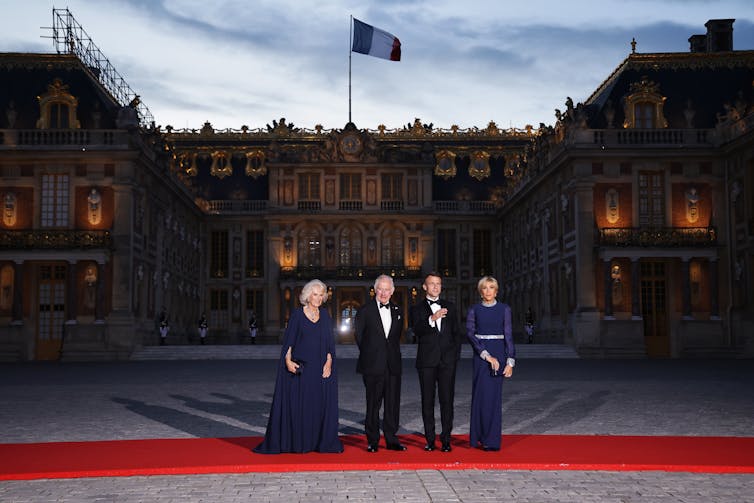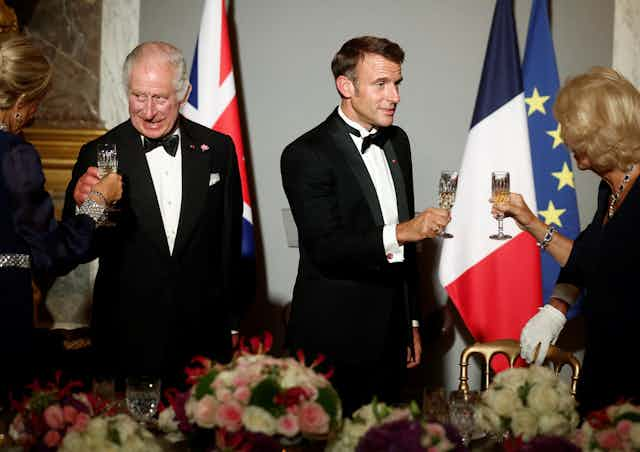King Charles’s three-day state visit to France, a year into his reign, has marked the return of the British monarchy’s international dimension. The trip, along with his first state visit earlier in the year to Germany, are the first among what is hoped will be many trips.
After a state visit to Germany and a visit to Malta in 2015, Elizabeth II stopped travelling overseas. This limited a key function of the monarchy, which is to represent the UK abroad as part of an overall package of soft power.
Other members of the royal family, including the then Prince Charles, conducted official visits overseas. But these fell short of the scale and spectacle of being a full state visit, which often includes great ceremony such as a full state banquet and an address to the host nation’s parliament.
The state visit to France also signals a shift towards a sharper monarchy. It was organised on government advice, probably to send a clear message that although the UK has left the EU, it still sees itself as part of Europe – a point that has become all the more important since Russia invaded Ukraine. These are precisely the sort of broad messages which command widespread support in the UK and that the monarchy is well placed to project.

That said, the king must also tread carefully. The monarchy can send such signals only if it maintains political impartiality – and perception is as important as the reality of any given situation.
When the King met Ursula von der Leyen, the president of the European Commission, it was a typical meeting between the king and a world leader. However, the meeting took place at a crucial moment in Brexit talks, leading some Brexit-supporting politicians to complain that the king was being drawn into politics.
The difficulty is that, given his past as Prince of Wales, Charles perhaps has to work harder than his mother did to prove his impartiality. His year on the throne has seen him hone his skills in this respect. The new sharpness of the new monarchy has been displayed on the domestic front but always with caution.
It was announced at the end of 2022, for example, that the King had made a personal donation of fridges to food banks, a move taken as a statement that the monarchy is mindful of underlying political conditions while not actively getting engaged in the political fray.
He has also shown a greater emphasis on diversity when selecting engagements. This triggered one of the most eye-catching photographs of the first year of the king’s reign, the king and queen walking down Brick Lane, a notable road in an ethnically diverse area of London.
It also appears that other members of the royal family have been given a freer rein. For example, Prince William joined his staff for dinner at an LGBTQ+-friendly restaurant in Warsaw during an official visit to Poland. This was seen to be in response to anti-LBGTQ+ politics in the country.
Treading carefully
Challenges lie ahead on the international front, too. For many of the 14 Commonwealth realms, such as Australia, Canada, Jamaica and Belize, which share the king as their head of state, the new reign is an opportunity to reevaluate their relationship with the Crown.
Especially in the Caribbean, this is wrapped up in the issue of addressing slavery and the worst excesses of the British Empire. Here, the king’s room for manoeuvre is limited.
He has endorsed a study of the monarchy’s relationship with slavery, and told the Commonwealth Heads of Government Meeting last year: “I cannot describe the depths of my personal sorrow at the suffering of so many, as I continue to deepen my own understanding of slavery’s enduring impact.”
Yet calls for reparations are not for the king to decide. They are a matter for the British government, which has to balance its response to any demand with domestic political opinion.
Ultimately, it is domestic opinion which will determine the success of the king’s reign. Even in the darkest days of the monarchy, republicanism never attracted support beyond 20%.
But after a long period of stability, the longer-term trend is gradual decline. This is most marked among younger adults, whose experiences of monarchy has been the departure of the Duke and Duchess of Sussex to America, together with allegations of racism – and of the allegations of sexual abuse against Prince Andrew.
Fundamentally, the biggest challenge for the king is following his mother. Especially during the last 25 years of her reign, Elizabeth II transcended the role of monarch, becoming a sort of world figure.
Books were published with titles such as “Queen of the World”. The former prime minister Boris Johnson called her “Elizabeth the Great”. The largest gathering of world leaders in history attended her funeral. How can Charles follow that?


